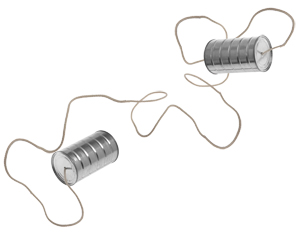
You’ve finished writing a letter or perhaps an e-mail to a customer, and are ready to send it off. But what about the embarrassing chance that you notice simple errors in your letter after it’s too late to change them, or worse, the customer points out the mistakes during a conference call?
Keep your communication, whether it’s to a client, a coworker or otherwise, professional, credible and well-written by having your work edited and reviewed by an editor, or even a colleague with strong writing skills, before pressing PRINT or SEND.
As it’s often difficult for a person accustomed to working with his or her own words to notice mistakes, even the best writers can benefit from having someone review their work prior to publication.
We all need someone to bounce ideas off of, someone to offer constructive criticism and make suggestions; someone to help us get to the point concisely; someone to tell us that this part and that part of our piece is dull.
Whether it’s information for a Web site, client correspondence or a business plan, an experienced editor can review your copy to make sure it’s devoid of grammar, punctuation or spelling mistakes.
An editor can also make suggestions for structural and stylistic improvements and even offer ideas for the organization of your communication piece. An editor can make sure your message is clear and correctly presented and can offer comments to improve your work in general.
But what if you don’t have an editor on staff or an employee who’s up for the task? Using a freelance editor may be the way to go. A great place to start searching for freelance editors is the Internet. A quick Google search yields numerous Web sites, businesses and individuals that offer freelance editing services.
For example, employers can search for freelance editors on the Editorial Freelancers Association’s Web site at www.the-efa.org. On the site, you can search for freelance editors by location, skills and specialties. Other sites that can put you in touch with freelance editors include www.editfast.com and www.wordsru.com.
While it’s beneficial to have an editor review your work, sometimes we must review our own written work, as the luxury of an editor isn’t always available to us in-house, and the expense of using a freelance editor isn’t in the budget. But even if you have an editor on staff or a freelancer on contract, you should always read and check over your own work. Self-reviewing will decrease the amount of time your document has to spend in edit.
Now, you’re probably saying, “But I don’t have an ‘eye’ for editing!” You’ll be pleasantly surprised by the mistakes you catch through your own review. Plus, you’ll become a better writer because self-reviewing causes you to be more cautious in your writing, and you’ll begin to take note of the mistakes you often make. Eventually, you’ll make those mistakes less and less, and writing the correct way will become habit.
As a general rule, don’t read your piece for every kind of mistake at once. This way, your brain isn’t doing too much at one time. Read your document several times, examining it with different objectives in mind.
Perhaps for the first read, you’ll check for punctuation. The second read, focus on spelling. The third time, check for structure and context. The fourth, check for formatting and style. Next, look at headings, illustrations, etc. If time allows, repeat this process and even mix it up.
Try some of the following editing and proofing tips—listed in no particular order, and this isn’t a complete list—the next time you compose a proposal, e-mail or other business document and must self-review your work. Then, press PRINT or SEND with confidence.
- Edit in the morning when your eyes are fresh; write in the afternoon.
- Edit your document on screen and on paper.
- Use a computerized spell-checker, but don’t rely on it.
- Read your document aloud and also silently.
- Read in reverse, word by word. This helps you catch spelling errors you might otherwise skim over.
- Make a list of your most common errors and keep those in mind as you read a document.
- Double check your work for the little words that are frequently interchanged. These include it and is; or and of; and on and an. Spell check won’t catch these for you.
- Punctuation needs to be carefully considered. For example, don’t use a semi-colon when a comma is just fine.
- Make sure each sentence has a beginning, middle and end. There needs to be a point to it, not just a mindless mush of information.
- Be sure to double check proper names, particularly the names of people and businesses. Misspelling someone’s name or the name of a company may be unforgivable and disastrous. Worse, what if your contract contains the name of another company or another owner?
- Always double check boilerplate and template text. Just because it’s regularly used in your company doesn’t mean the coworker before you carefully reviewed it.
- Look at the format of the document first, before going in to read it. The format needs to flow, drawing the eye along to the next sentence, section and page.
- Ask yourself the five W’s in writing (who, what, when, where and why), as well as how when reading for content. Does the copy answer all the questions you have or believe it should? If not, what’s missing?
- Know your audience and write/edit with that audience in mind.
- If something sounds too wordy, then it probably is. Be concise. For the most part, you should remove words during the editing phase—not add them.
- Use the active voice rather than the passive voice: “I made an error” (active) vs. “Errors were made” (passive).
Even the most trivial mistakes or typographical errors can be a credibility killer. What if a hastily written proposal ends up in the hands of a customer’s attorney or accountant or in the possession of the banker who’s considering increasing a customer’s line of credit?
Even the most minor of errors could devalue a business document and reflect poorly on the customer and maybe even discredit your company’s reputation, as the mistakes may cause the reader to question the reliability, professionalism and credibility of the writer and that of the firm employing the individual. What’s more, the accuracy of the information presented may be doubted if the document is laden with typos.
But what does a well-written document indicate? The more eloquent-sounding your document is, the greater likelihood it’ll be read and understood by your intended audience. Accordingly, you’ll increase your trustworthiness and credibility as a writer as well as that of your employer. In “10 Steps to Successful Business Writing,” author Jack E. Appleman said a well-written document can show readers that:
- You understand all aspects of the problem and can clearly convey them.
- You understand how the problem affects various people and departments.
- You’ve thought about potential solutions and can explain the options clearly.
- You know what steps different people should take and when they should take them.
In his book, Appleman said any employee who writes effectively will look better to the people who may play a role in determining his or her future with the company. Clearly, good writing skills are a must if you want to make a good impression in the workplace and succeed professionally.



